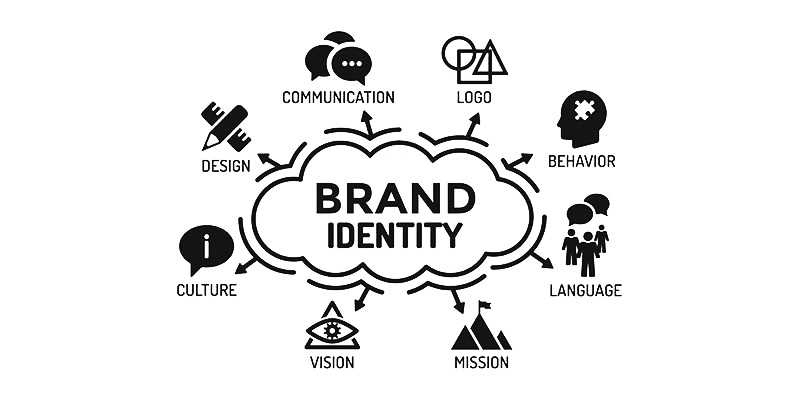Why Brand Identity Matters for Indian Startups in 2025
India is home to one of the fastest-growing startup ecosystems in the world. By 2025, it’s projected that India will host over 100,000 startups, with sectors like fintech, healthtech, agritech, and edtech leading the charge. In this competitive environment, building a strong brand identity is no longer optional—it’s a survival strategy.
A well-crafted brand identity helps Indian startups:
- Stand out in a crowded marketplace.
- Build trust among consumers.
- Create emotional connections that drive loyalty.
- Attract investors and global partners.
This ultimate guide will walk you through everything you need to know about building a brand identity tailored for Indian startups in 2025—covering strategies, challenges, case studies, and future trends.
Understanding Brand Identity: Beyond Logos and Colors
What Brand Identity Really Means
Brand identity is the tangible and intangible essence of your company—how you present yourself to the world and how customers perceive you. It goes beyond a logo or a tagline; it’s about your mission, values, voice, design, and customer experience.
Difference Between Brand Identity, Branding, and Brand Image
- Brand Identity → Who you are (mission, logo, personality).
- Branding → The process of shaping and communicating your identity.
- Brand Image → How the audience perceives you.
In short, your identity is your blueprint, branding is the execution, and brand image is the result.
The Indian Startup Ecosystem in 2025
Key Growth Sectors (Fintech, EdTech, HealthTech, etc.)
By 2025, Indian startups are expected to dominate in fintech, edtech, healthtech, AI, and sustainability-driven solutions. Each of these sectors requires tailored branding strategies to connect with both local and global audiences.
Cultural Nuances Shaping Indian Brands
India’s diversity plays a critical role in branding. Successful startups often localize their messaging in multiple languages, embrace cultural festivals, and highlight values like trust, affordability, and community.
Essential Elements of a Strong Brand Identity
Defining Your Startup’s Purpose, Mission, and Vision
Your brand’s “why” forms the foundation. For Indian startups, aligning with social causes like sustainability, education, or financial inclusion often resonates deeply with audiences.
Crafting a Unique Value Proposition (UVP)
In a saturated market, your UVP explains why customers should choose you over competitors.
Brand Personality and Voice
Should your startup sound professional, quirky, or empathetic? Defining this voice ensures consistent communication.
Visual Identity: Logos, Typography, and Color Psychology
Colors influence emotions—red signals passion, green denotes growth, and blue reflects trust. Typography adds personality, and logos create instant recognition.
Storytelling and Emotional Connection
Storytelling humanizes startups. Narratives about founder journeys, customer impact, or community contributions can forge strong emotional ties.
Steps to Building a Brand Identity for Indian Startups
Step 1: Market Research and Competitor Analysis
Before you design a logo or choose a tagline, start with market research. Study your competitors, analyze what works for them, and identify gaps you can fill. For Indian startups, this often means looking at both local players and global competitors.
Step 2: Identifying Your Target Audience
A brand identity is only effective when it resonates with the right audience. For instance, fintech startups targeting urban millennials should adopt a modern, tech-savvy tone, while agritech startups may focus on trust and empowerment for rural communities.
Step 3: Creating Brand Guidelines
Consistency is key. Establish clear rules for:
- Logo usage
- Fonts and typography
- Color palettes
- Tone of voice
- Social media behavior
This ensures that whether it’s a website, pitch deck, or Instagram post, your brand feels cohesive.
Step 4: Leveraging Digital Platforms (Social Media, SEO, and Paid Ads)
Indian consumers spend an average of 3+ hours daily on digital platforms. Startups should:
- Use SEO to rank higher in searches.
- Leverage Instagram Reels, YouTube Shorts, and LinkedIn for engagement.
- Run targeted paid ads to build recognition.
Step 5: Building Consistency Across Touchpoints
Your brand should feel the same whether a customer sees an ad, visits your website, or talks to customer support. This seamless experience builds trust and loyalty.
Branding Challenges for Indian Startups in 2025
Budget Constraints and Resource Limitations
Startups often have limited funds to invest in professional designers or marketing campaigns. Creative solutions like using freemium design tools or partnering with student designers can help.
Standing Out in a Saturated Market
With thousands of startups launching every year, differentiation is difficult. The answer lies in a clear UVP and authentic storytelling.
Balancing Global Appeal with Local Relevance
Startups that aspire to scale internationally must balance global professionalism with local authenticity. For example, keeping messaging in English while also integrating regional languages.
Case Studies: Successful Indian Startup Brand Identities
Zomato’s Quirky Branding Approach
Zomato is known for its witty social media presence and relatable campaigns. Their branding is playful yet consistent, making them a household name.
Byju’s Educational Impact Branding
Byju’s built its identity around empowerment through learning. Their branding emphasizes trust, aspiration, and accessibility for millions of Indian learners.
Nykaa’s Beauty and Lifestyle Branding
Nykaa’s success lies in positioning itself as a lifestyle enabler. With strong influencer marketing and community-driven branding, they’ve become a leader in beauty and personal care.
The Role of Technology in Brand Identity
AI-Driven Personalization for Startups
AI helps startups deliver personalized content and product recommendations, making customers feel valued and understood.
AR/VR Experiences in Branding
Startups are using AR-powered try-ons (like Nykaa’s virtual makeup tool) to enhance customer experiences.
Blockchain for Brand Transparency
Blockchain offers supply chain transparency—especially important for startups in food, fashion, and sustainability.
Branding Trends Indian Startups Must Watch in 2025
Sustainability and Ethical Branding
Consumers in 2025 expect brands to be eco-conscious and socially responsible. Startups embracing sustainability will gain an edge.
Influencer and Community-Driven Branding
Micro-influencers and community ambassadors often build stronger trust than celebrity endorsements.
Voice Search and AI Branding Tools
With the rise of voice assistants like Alexa and Google Assistant, optimizing brand identity for voice search is becoming crucial.
Practical Tools and Resources for Startup Branding
Free and Paid Logo Design Tools
- Canva (freemium)
- Looka (paid)
- Hatchful by Shopify (free)
Social Media Management Platforms
- Hootsuite
- Buffer
- Zoho Social
Analytics and Brand Tracking Tools
- Google Analytics
- SEMrush
- Brandwatch
These tools help startups track performance and optimize brand visibility.
FAQs on Building a Brand Identity for Indian Startups
Q1. Why is brand identity important for Indian startups?
A strong brand identity builds trust, credibility, and differentiation in a competitive market.
Q2. How much should a startup spend on branding?
Budgets vary, but startups can begin with affordable design tools and freelancers, gradually scaling as they grow.
Q3. Can Indian startups build global brands?
Yes! With the right balance of local authenticity and global professionalism, many Indian startups like Zomato and OYO have gone global.
Q4. What’s the difference between branding and marketing?
Branding is about who you are, while marketing is about how you promote yourself.
Q5. What are the top branding mistakes startups make?
- Inconsistent visuals
- Ignoring customer feedback
- Copying competitors instead of building a unique identity
Q6. How long does it take to establish a brand identity?
It varies, but most startups begin to see recognition in 6–12 months with consistent branding efforts.
Conclusion: Future-Proofing Your Startup’s Brand Identity
Building a strong brand identity is a long-term investment—not just a marketing exercise. For Indian startups in 2025, success lies in being authentic, consistent, and adaptable.
By combining storytelling, digital strategies, technology, and cultural relevance, Indian startups can craft brands that not only survive but thrive in a competitive marketplace.
👉 Remember: Your brand identity isn’t what you say it is—it’s what your customers believe it to be.
Build a Powerful Brand Identity for Your Startup Today!
🚀 Whether you need a striking logo, a consistent visual identity, or a complete brand strategy, Softworks is your trusted partner in crafting brands that stand out and connect with your audience!
📞 Let’s Discuss Your Project – Contact us today!
🔗 Visit: www.getsoftworks.com
📩 Email: [email protected]
📞 Call: +91 94297 85533





